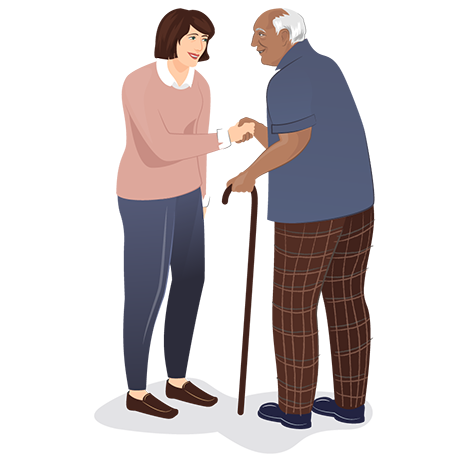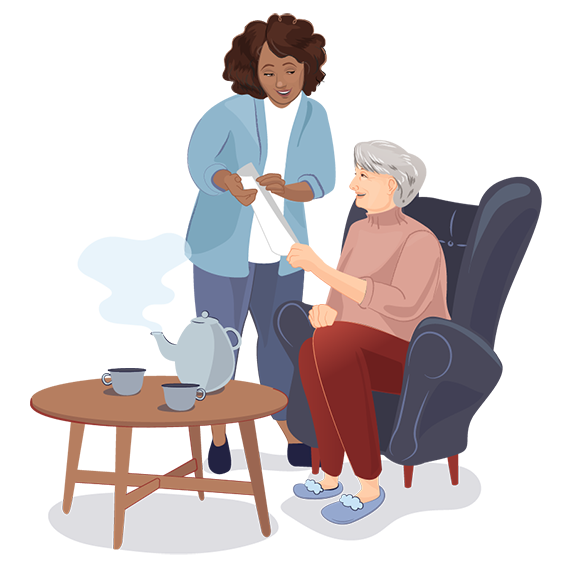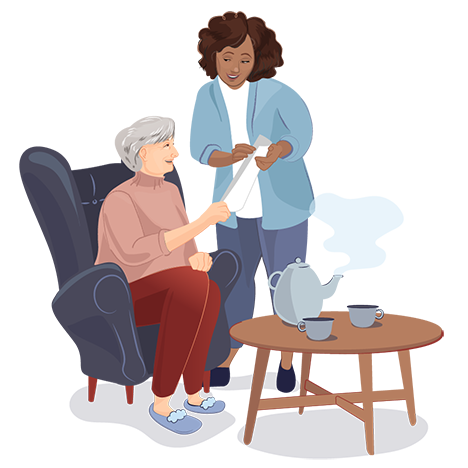
Dementia: What are the Early Signs?



Speak to one of our experts
Our friendly experts are here to help from 9am to 7pm, 7 days a week.
If your elderly loved one is living with dementia, it can be a lot to process, regardless if it is something you yourself are suffering, or another family member or loved one is experiencing. This guide gives advice and information about dementia from a live in care agency with experience providing specialist dementia live in care.
This guide will cover:
The early symptoms of dementia
How do I find a live-in carer for dementia?
What is dementia?
Since dementia does not refer to one disease, there are a variety of different symptoms that can be associated with dementia. For instance, in fronto-temporal dementia there may be more behavioural and emotional problems whereas in lewy-body dementia, often there are visual hallucinations. There can also be variations between early dementia symptoms and the type of dementia someone is living with. If you are unsure about how dementia is affecting your elderly loved one, contact your local GP for medical advice. It may be appropriate to consider live-in dementia care; you can read more about how dementia care works below.
For more information about how live in care for the elderly works, read our guide: What is Live in Care?
The early symptoms of dementia
The list below is a guide to some of the early signs of dementia that can be noticeable in people suffering from dementia. This list is not an exhaustive list of the effects of dementia nor do all people suffering from dementia present with all of these symptoms.
1. Memory loss
Memory loss is probably the most well-known symptom of dementia. Often in Alzheimer’s Disease, the individual may struggle with short-term memory. For instance, they may forget to lock the front door or turn off the oven. They may lose things more frequently and forget someone’s name. In other dementias, such as Vascular Dementia or Lewy-body Disease, memory loss may not be an early symptom of the disease but rather one that develops later on. Memory naturally worsens as we age, so it is important not to jump to the conclusion that the person with memory difficulties has dementia. Often someone with dementia will not just show memory difficulties but they will also have additional symptoms from this list.
2. Difficulty performing basic tasks
You may notice that someone is struggling with tasks that they used to have no difficulty with previously. This may be something such as maintaining their personal hygiene or cooking a meal. When someone loses the ability to perform basic tasks that they used to perform well, this can sometimes be a sign of dementia.
3. Language problems
One way to know how to recognise dementia is a loss in communication ability. This can be with both speech production and understanding. You may find that someone is struggling to follow a conversation or is repeating themselves often. In some cases, people may struggle to name items correctly or may forget the word that they are looking for.
 4. Attentional difficulties
4. Attentional difficulties
Dementia may cause problems with attention, that is, the ability to focus and sustain that focus. Someone with signs of dementia may show a lack of concentration or find themselves getting distracted easily. Attention can also impact on a person’s ability to learn and recall information so memory can be affected as a result.
5. Disorientation
Getting lost when outside the home in a familiar place can be a warning sign for dementia. As can being disorientated to the time, day and date. If someone misses appointments and social events this can be a sign that they are not orientated to the correct date. If dementia is more severe, then the person may find themselves being disorientated within their own home or being unsure of whether it is night or day.
6. Poor judgement
Someone with dementia might show signs of poor judgement. They may for example put on summer clothes in cold winter months or be unsure of why they need to brush their teeth. Poor judgement can also extend to financial decisions, for instance, they may be writing large cheques and giving away money, whilst leaving themselves with not enough money to buy groceries or pay bills.
7. Poor spatial awareness
Sometimes dementia can affect visuospatial skills which include both the images we see (visual), as well as our perception of the size and location of our surroundings (spatial). This is sometimes hard to notice but if you find someone is falling more often, has problems when driving or reading, is less able to recognise faces and/or has an increase in wandering, then these can all be warning signs.
8. Change in social skills
Dementia can affect the brain in such a way that social skills change. Someone may show a lack of interest in socializing, they may have a decreased ability to speak to others, or they may show increased socially inappropriate behaviour. This usually does not occur with natural ageing, however, social skills can change if someone has a mood disorder, such as depression.
9. Mood changes
Mood swings and rapid changes in mood can be an effect of dementia. They may lose their temper for no apparent reason or become less able to demonstrate emotions.
10. Apathy
A person with dementia may become very passive, sitting in front of the television for hours, sleeping more than usual, or they may lose interest in hobbies they were previously fascinated by.
How do you test for dementia?
There is no one test for dementia. Usually testing for dementia involves a variety of different professionals and investigations. A doctor will want to know more about the patient’s medical history and to understand more about the onset of symptoms and other medical conditions they may have. A neurologist may want to conduct a brain scan to look at the structure of the brain and whether there are any abnormalities. Cognitive testing is often requested, which involves completing lots of different pen and paper tasks that look at memory, language, attention, visuospatial skills and problem-solving skills. This can help determine what aspects of cognition the patient is struggling with and see whether their scores are worse than other people their age. Often people are monitored over time to see whether their symptoms progress as one of the recognition signs for many dementias, is a worsening of symptoms over time.
 How does dementia start?
How does dementia start?
Scientists do not exactly know the reasons why an elderly person may start developing a certain type of dementia. The illnesses that dementia causes can include Wernicke-Korsakoff syndrome, which is a non-progressive type of dementia. Other types of dementia such as Alzheimer’s Disease, are less well understood. Often, when an elderly person develops dementia, changes in their behaviour are subtle at the beginning of their illness, and develop over time. Each case is unique and it is important to speak to a medical professional should you have any concerns.
How do I find a live-in carer for dementia?
An introductory agency can do all of the hard work for you in terms of finding, vetting, reference checking and ID checking potential candidates for live in care. The agency should take the time to understand individual preferences, needs and circumstances to match you to a skilled and experienced live in carer.
How we can help
We are a live-in care agency that spend time to find your loved one the right carer for their needs. We work hard to ensure your loved one feels comfortable and reassured by a live-in carer, meaning they can stay at home and feel safe and secure. We will work with you to find a suitable carer for your elderly loved one, and take the time to ensure your elderly relative or friend is happy with their carer.
We have many experienced and compassionate dementia carers in our team, and our office team will be happy to speak to you to understand your situation. You can reach out to us today and arrange care for a loved one, otherwise give us a call on 01184 492373.
If you would like to read more about live-in care in all of its facets, you can also read our guide to live-in care here.

 What is dementia?
What is dementia?




